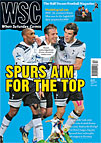 Since the relegation from the Premier League in 2000, Sheffield Wednesday have been plagued by problems on and off the pitch. Tom Whitworth outlines the importance of Milan Mandaric’s recent takeover
Since the relegation from the Premier League in 2000, Sheffield Wednesday have been plagued by problems on and off the pitch. Tom Whitworth outlines the importance of Milan Mandaric’s recent takeover
Huge debt and a series of winding up petitions meant Sheffield Wednesday were close to administration last year. Thanks though to Milan Mandaric’s £8 million takeover, their long-standing financial problems, preceding even their relegation from the Premier League in 1999-2000, have abated at last.
Mandaric had been looking for a new investment opportunity since selling Leicester City for a reputed £40m in February to a Taiwanese consortium. And the Owls, despite trading “insolvently”, were an appealing option as their largest creditors were willing to accept only a fraction of the money due to them. In the takeover, the Co-operative Bank agreed to settle its £23m of loans for only £7m, while similar deals were reached with six other private lenders, among them current and former directors. Many of these repaid loans are to be converted to equity, effectively valuing Wednesday at over £24m. (In past years other parties interested in buying the club – including the Chicago-based Club 9 Sports and a consortium fronted by former Owls goalkeeper and manager Chris Turner – had come and gone. Each had raised hopes but none was able to provide the funds. Crucially, Mandaric could.)
The heap of pre-takeover debt (around £30m) was a legacy of years of folly and excess at Wednesday. In 1989 there was no bank debt. However, under the direction of Dave Richards – now chairman of the Premier League – borrowings grew and grew, first to £1.4m in 1990, then up to £8m in 1996 as the stadium underwent an upgrade for the European Championship. Four years later, a season after Paolo di Canio nudged referee Paul Alcock to the floor, they were relegated from the Premier League.
High wages were retained in Division One – among those on long, costly contracts were Gerald Sibon, Andy Hinchcliffe and Gilles de Bilde – while the flow of vital TV money was cut. “[Money] was the only reason we were still playing in England,” wrote De Bilde in his autobiography. “Each of us made a drawing of how he saw his future. I drew a nice villa in Spain with a waiter serving me while a plane dropped pounds over me.” Less splendidly for the club, another relegation came in 2003.
At board level, Dave Allen took over as chairman and reintroduced a sensible financial approach. Although unpopular with fans, his “spend what you earn” policy was absolutely necessary to provide stability; his prudent judgment, gifts and loans (£1.5m) helped the Owls to a much firmer footing before he left in 2007. The telecoms entrepreneur Lee Strafford followed Allen, promising to transform the club and attract investment in the process.
Good public relations were created, the matchday experience improved and the spend on wages increased, but the revenue required to pay for it was not forthcoming (due in part to over-optimistic ticket-sale predictions). He left last May, the same month Wednesday were relegated, again, to League One.
Worse still, a £3m gap emerged in this season’s budget, so the club stopped paying its tax. In response HM Revenue & Customs, owed PAYE and VAT, brought three winding up petitions, one in September, another one two months later in which they were given leave to secure investment. (Ironically this was the same day a grinning Dave Richards strolled along the Wembley carpet, greeting the players before England v France.) A third petition was scheduled for early December. The situation was desperate.
Following the game against Southampton in September chairman Howard Wilkinson spelled out the grim reality. “This club is in trouble,” he said. “The only thing that is going to sort this situation out is getting somebody with some money to the table.” If not for Mandaric arriving then, administration would likely have followed.
Some have raised concerns over the new owner. He is due in court on February 11, facing charges of tax evasion along with Harry Redknapp and former Portsmouth chief executive Peter Storrie, though he dismisses the claims as “ridiculous”. Mandaric is also known to lose patience with managers (sacking three, for example, at Leicester).
Yet he claims to admire Alan Irvine and has pledged funds for this transfer window, which should help improve an already effective team. And of course, both Portsmouth and Leicester were promoted under his charge. Now he is at Sheffield Wednesday. “I have the experience [and] enthusiasm to get the club going in the right direction,” he says. “There are many things we can achieve.” Most supporters of the club will be happy with that.
From WSC 288 February 2011